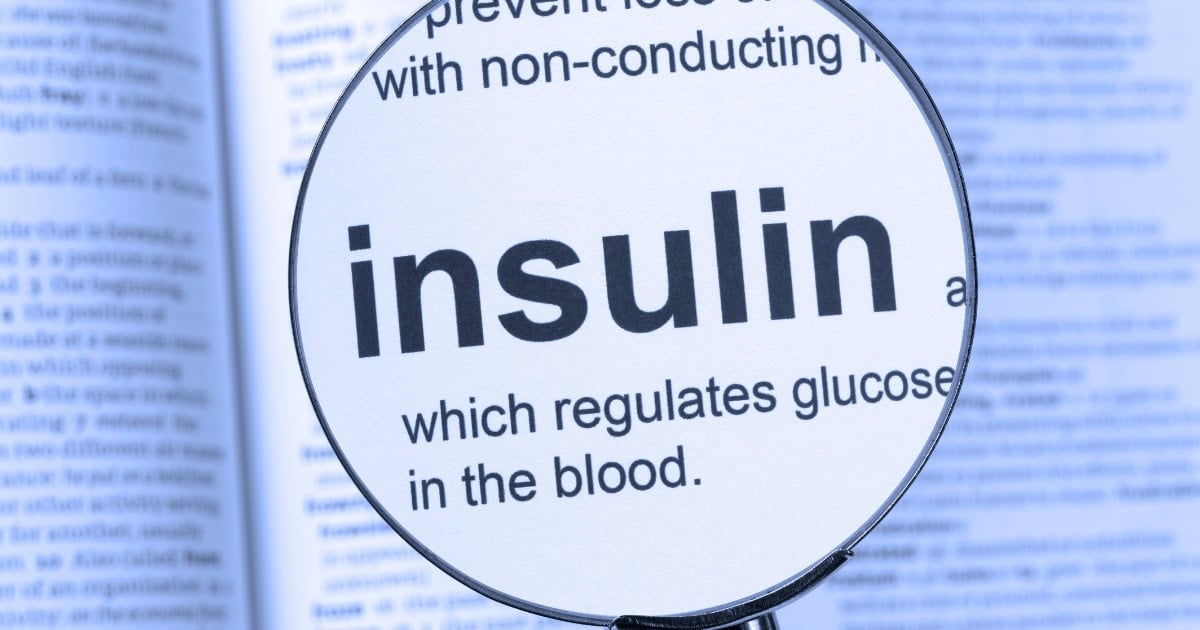Insulin sensitivity plays a key role in managing diabetes. For those with type 2 diabetes, it affects how well your body responds to insulin, while in type 1, changes in sensitivity become more noticeable over time as your insulin needs fluctuate.
This article outlines six ways to improve insulin sensitivity, making it easier to maintain healthy blood glucose (sugar) levels.

Key Points:
- Regular physical activity, especially daily walks, significantly boosts insulin sensitivity.
- Improving your diet by reducing processed foods and incorporating whole foods can enhance insulin sensitivity.
- Reducing stress and getting sufficient sleep can lower insulin resistance, which improves blood sugar management.
- Weight loss, even small amounts, can lead to a noticeable improvement in insulin sensitivity and reduced insulin needs.
What is insulin sensitivity?
Insulin sensitivity determines how much insulin your body needs to maintain healthy blood sugar levels. The less sensitive you are to insulin, the more insulin your body requires, which can be worsened by insulin resistance.
Read more in: Insulin Resistance: Symptoms, Causes, and Treatment Options.
While some factors like hormones (e.g., estrogen, testosterone, cortisol, adrenaline) are beyond your control, stress and hormonal fluctuations can increase insulin resistance.
Improving insulin sensitivity, much like maintaining a healthy A1c (a measure of glucose management over the previous 2 to 3 months), makes it easier to reach your blood sugar goals, whether you produce insulin naturally or use injections.
How to improve your insulin sensitivity
Here are some effective ways, in no particular order, that you can improve your body’s insulin sensitivity as a person with diabetes.
1. Get moving
One of the most effective ways to improve insulin sensitivity is through daily physical activity.
Even a simple walk can help your body pull glucose into your cells and use it for energy, reducing your insulin needs both during and after exercise.
Making exercise a regular habit may seem daunting, but you don’t need a gym membership or hours of time. Start with just 10 to 15 minutes a day, and as your energy and mobility improve, you can gradually increase your activity. Your body will thank you!
2. Improve the quality of your diet
If you haven’t evaluated your current eating habits, now is the time.
Changing your relationship with food is often more challenging than adding exercise, like swapping a bowl of pasta for a salad with chicken.
Many fad diets have restrictive rules, which can be hard to maintain long-term.
But improving your diet doesn’t have to be drastic or immediate. Start small by keeping a food diary for a few days, then focus on one area where you can introduce healthier options, such as a better breakfast.
Remember, your relationship with food evolves over time, and it should still taste good!
Learn more in: Insulin Resistance Diet for Diabetes – What to Eat & What to Avoid.
3. Lose weight
Improving your diet and staying active will naturally help with weight loss, which significantly impacts insulin sensitivity.
Excess body fat reduces your body’s response to insulin, leading to higher insulin needs. Even losing just 5 pounds can result in noticeable blood sugar improvements and potentially lower insulin doses.
For those at an average weight, this may require adjusting insulin to avoid low blood sugars — talk to your doctor about this.
Weight loss takes time, often 4 weeks before you notice changes in clothing or the scale. Instead of focusing on weight, track daily habits like exercise and food choices.
Consistency, not perfection, will lead to progress. If you slip up, reset the next day and keep going.
See more in: How to Lose Weight with Type 1 Diabetes.
4. Reduce stress
Managing stress is challenging since it’s a natural part of life, and even positive events can trigger a stress response that worsens insulin sensitivity.
Hormones like cortisol, adrenaline, and norepinephrine cause your liver to release glucose, leading to blood sugar spikes.
Prolonged stress can result in long-term insulin resistance, making it harder to manage blood sugar levels.
While reducing stress triggers can be difficult, adjusting insulin doses or medications with your doctor’s guidance can help manage the effects of ongoing stress on your insulin sensitivity.
Learn more in: Diabetes & Stress: How Stress Affects Your Blood Sugar.
5. Get more sleep
Lack of sleep increases cortisol production, leading to insulin resistance.
While missing a few hours of sleep occasionally may only cause short-term blood sugar fluctuations, consistently getting too little sleep results in chronically high cortisol levels, which significantly impacts your insulin sensitivity.
Though cortisol is essential for survival, too much can be harmful.
Sleep is vital for overall health, especially if you have diabetes. Aim for at least 7 to 8 hours a night, and if blood sugar fluctuations are disrupting your rest, talk to your healthcare team to adjust your insulin doses and improve your sleep quality.
Read more in: Diabetes and Sleep Problems: Causes and Treatment Options.
6. Drink less alcohol
Alcohol acts as a toxin, prompting your liver to prioritize eliminating it over other functions.
While moderate alcohol consumption (one drink per day for women, two for men) has been linked to improved blood sugar levels, the line between benefit and harm is thin.
Studies show that even 30 days of alcohol abstinence can significantly improve insulin sensitivity.
Conversely, binge drinking — even once a month — increases the risk of type 2 diabetes and insulin resistance, with effects lasting long after the alcohol has left your system.
See more in: Diabetes and Alcohol: How Does Alcohol Affect Blood Sugar?
Why improving insulin sensitivity isn’t complicated
Improving insulin sensitivity boils down to basic principles of overall health.
Whether or not you have diabetes, these habits — exercise, nutrition, weight loss, sleep, stress management, and reducing alcohol — can help you live a longer, healthier life while lowering your risk of heart disease, cancer, dementia, and more.
No amount of medication can replace consistently making smart lifestyle choices.
If the full list feels overwhelming, start by focusing on one or two areas for the next 6 months, and you’ll likely find motivation to tackle the others as you go.
Did you find this article helpful? Click Yes or No below to let us know!





Karen
I have been an IDDM for 55 yrs. (No complications) I love reading your article’s they are very insightful.
Jo Haven
Thank you for this beautifully written article!
As long as I do the best that I can today, with what I have, I will be okay 🙂
Steven Dana Leonard
Continued study on insulin resistance to my body helps, now having that trouble. Thank you for the wonderful article.
CJ
I struggle with hypoglycemia. This means insulin sensitive, correct?
I am changing my diet and will begin working out to prevent getting diabetes.
What should I eat pre-workout and post-workout to avoid the hypoglycemia?
Thanks a bunch!
Christel Oerum
If you have an issue with hypoglycemia (low blood sugar), the first step is to see your doctor and have your hormone levels checked. Usually, untreated diabetes results in hyperglycemia (high blood sugar). But generally, carbohydrates are your friend when trying to prevent hypos. If you combine it with a fat source (like peanut butter, oil, avocado) the release of the glucose becomes more prolonged and it can be a great way of stabilizing blood sugars
Sally Doyle
Dear Christel,
I cannot thank you enough for offering this website. The information you give is professional and reliable. It has helped me go from Type 2 diabetes on Metformin to no meds and personal management. I continue to work on more physical activity and my daily diet has changed for the better.
Thank you so much!
Christel Oerum
I’m so glad to hear that Diabetes Strong has been a positive resource for you. Thank you for taking the time to write and congrats on your health progress
Alan sizmur
Thank you for all you do. As a type 1 diabetic for the past 30yrs I’m so glad I came across your site and FB group. You provide the best information and reaources.
Christel Oerum
Thank you, I’m glad you find it helpful
Carolyn
Thank you
Panda
Hi. I am having type 2 diabetics. Now I am trying to eat more meat and veges for my meals and reducing carb below 100g per day. Will it help to reduce my blood sugar level and improve in my insulin resistance?
Christel Oerum
It most likely will help, but it’s not a guarantee that your blood sugars will return to normal levels (Read more here:https://diabetesstrong.com/is-type-2-diabetes-reversible/). Try adding in exercise as well and you’ll increase your likelihood of improving your insulin sensitivity
Tim
Hi Ginger, Thanks for your great articles and journalism. They’ve helped me a ton.
I have had Type 1 Diabetes and have been eating low carb (50-100gm/day) for about 2 years. 4 weeks ago I started a ketogenic diet and, in general, have been feeling good. I am an avid cyclist and also lift weights. With my job, I can only work out early in the morning. I have been doing a 30-60 minute HIIT session or cycling intervals, usually fasted 3-4 mornings per week.
For several years, I have been having what I think is a cortisol response after workouts with my blood sugar and insulin resistance going up 30-60 minutes after the workout and continuing for 4-6 hours before returning to my normal insulin sensitivity. During this time, my body feels drained of energy and my muscles are crampy and achey. It is similar to the feeling I’ve had when my insulin pump or site failed and I didn’t get insulin for 3-4 hours. I stopped intermittent fasting to try to address this and it hasn’t helped. Any ideas on how to address this? Do I just need to start eating some carbs before my workout? Thanks for any help.
Ginger Vieira
Hi TIM!
YES — this actually isn’t insulin resistance. It’s your liver dumping glycogen to convert into glucose to be cycled back to your muscles to replenish their glycogen stores! When you do an intense workout, the stored glucose in your muscles is used as fuel to help your muscles perform. If you don’t eat a decent carb-meal after that workout (in the first hour, I’ve found) and take plenty of insulin with that meal, your liver is going to dump glycogen to help your muscles get the fuel they need to recover and grow stronger.
You can’t avoid it! It’s the physiological process of caring for your muscles needs.
If you’re eating a ketogenic meal and don’t want to eat carbs, you can expect that your body is going to convert as much of the protein in that meal into glucose as possible and if it’s not enough to replenish your glycogen stores, your liver is going to keep pumping out glycogen too.
You’ll need to take insulin to cover that liver dump of glucose — and honestly, you’d have an easier time (and need less insulin) if you just fueled with some good quality carbs after your workout.
Let me know what your current post-workout nutrition looks like, and what you think you’ll try next!
Diane
Thanks Ginger!
I had been having the same issues for years!!!